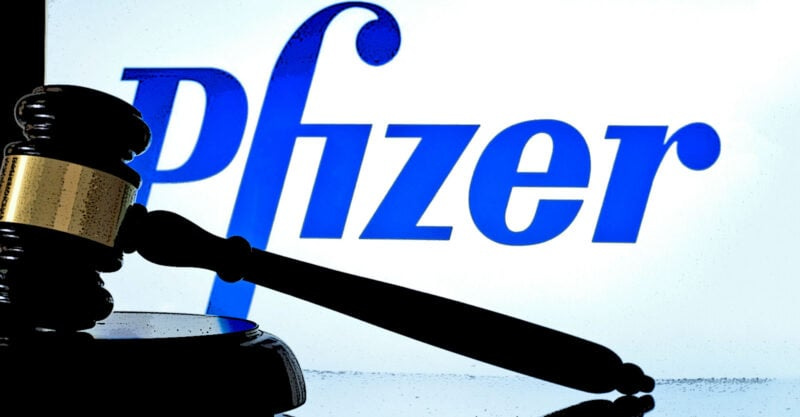Will Pfizer Be Held Accountable? Federal Judge Sends Kansas Lawsuit Against COVID Vaccine Maker Back to State Court
The floodgates are opening...
This article originally appeared on The Defender and was republished with permission.
Guest post by Suzanne Burdick, Ph.D.
Pfizer tried to keep the case in federal court, arguing that the PREP Act, which shields COVID-19 vaccine makers from liability for injuries caused by the vaccines, “completely preempts” the consumer protection claims made by the state of Kansas. But a federal judge today ruled the case must proceed in state court.
The state of Kansas can sue Pfizer in state court for misleading the public about its COVID-19 vaccines, a federal judge ruled today.
Pfizer tried to keep the case in federal court, arguing that the Public Readiness and Emergency Preparedness Act (PREP Act), which shields COVID-19 vaccine makers from liability for injuries caused by the vaccines, “completely preempts” consumer protection claims made by the state of Kansas.
Ray Flores, senior outside counsel for Children’s Health Defense (CHD), called the ruling a “major victory.”
“This first-of-its-kind ruling declares Pfizer’s deceptions aren’t afforded carte blanche treatment, as Mr. Bourla [CEO of Pfizer] probably assumed they’d be,” Flores said.
CHD General Counsel Kim Mack Rosenberg agreed. “This decision is important because it creates a viable path for Pfizer to potentially be held accountable for its wrongdoing on a massive scale.”
On June 17, 2024, Kansas sued Pfizer, alleging the pharmaceutical giant misled the public by marketing its COVID-19 vaccine as “safe and effective” while concealing known risks and critical data on limited effectiveness.
The lawsuit, filed by Kansas Attorney General Kris Kobach in the District Court of Thomas County, alleged that beginning in 2021, Pfizer covered up the fact that the vaccine was connected to serious adverse events, including myocarditis and pericarditis, failed pregnancies and deaths.
The complaint also alleged the company falsely claimed that its original vaccine retained high efficacy while knowing that efficacy waned over time and didn’t protect against new variants.
Pfizer also misled the public by claiming the COVID-19 vaccine would prevent transmission, even though the company never studied the vaccine’s capability to prevent transmission.
By marketing the vaccine as safe and effective despite its known risks, Pfizer violated the Kansas Consumer Protection Act because millions of Kansans heard those misrepresentations, the complaint alleged.
Lawsuit is about deceptive marketing, not physical injuries or death
In July 2024, Pfizer successfully removed the Kansas lawsuit to federal court. However, in a September 2024 motion, Kansas asked for the case to be sent back to state court.
Pfizer filed an opposing motion in October 2024, in which it presented three arguments for why the case belonged in federal court. The final argument was that Kansas’ claims were “completely preempted by the PREP Act and are thus removable to federal court.”
In today’s ruling, U.S. District Judge Daniel D. Crabtree rejected all three of Pfizer’s arguments.
Crabtree rejected Pfizer’s PREP Act argument because all of Kansas’ claims are about deceptive marketing, not physical injury or death from Pfizer’s COVID-19 shot. “That point alone ends the debate,” Crabtree wrote.
He remanded the case to the District Court of Thomas County.
Pfizer will likely appeal the decision, according to Flores. “Without PREP protection, Pfizer will have to face the music and try to defend its lies in open court.”
‘Today’s ruling sets a new, persuasive precedent’
Today’s ruling will likely embolden other states that have already expressed interest in suing Pfizer for violating state consumer protection laws, Flores said.
Until now, courts have generally allowed Pfizer to claim legal immunity from lawsuits under the PREP Act.
For instance, the U.S. District Court for the Northern District of Texas, Lubbock Division, dismissed a consumer protection suit brought by Texas against Pfizer.
“Today’s ruling sets a new, persuasive precedent and provides a roadmap for others to follow,” Flores said.
Several other ongoing suits have also challenged the PREP Act as an immunity shield for vaccine makers. But unlike the Kansas and Texas cases, these suits are not consumer protection lawsuits, according to Flores.
For example, a North Carolina lawsuit filed in 2022 by the mother of a 14-year-old boy who was administered a COVID-19 vaccine at his school without his or his family’s consent recently got the green light from the Supreme Court of North Carolina to proceed.
In March, the Supreme Court of North Carolina overturned the decisions of two lower courts, ruling that the PREP Act does not preempt state law requiring parental consent for vaccination. The court also ruled that the PREP Act does preempt injury claims filed under tort law.
That case will now return to the North Carolina Court of Appeals to address questions relating to state law and the state Constitution. In July 2024, CHD filed an amicus brief urging the Supreme Court of North Carolina to overturn the lower courts’ dismissal of the case.
Additionally, a federal court ruled in November 2024 that the PREP Act’s liability shield does not extend to breach-of-contract claims.
The ruling came after Brianne Dressen sued AstraZeneca in May 2024, alleging she was disabled by the company’s COVID-19 vaccine in 2020. According to the complaint, AstraZeneca’s consent form for trial participants promised medical treatment for illness or injury suffered during the study, but the company reneged on this promise.
According to the November 2024 ruling, Dressen’s claim is based on “a broken promise, not a countermeasure.”
AstraZeneca has appealed. Dressen’s response is due June 4, 2025, Flores said.
Related articles in The Defender
Kansas Sues Pfizer Over Misleading COVID Vaccine Safety and Efficacy Claims
Texas Appeals Ruling in Lawsuit Against Pfizer, Challenges PREP Act Immunity Shield
Lawsuit on Behalf of Vaccine-injured Seeks to Strike Down ‘Unconstitutional’ PREP Act
Donate to Children’s Health Defense


